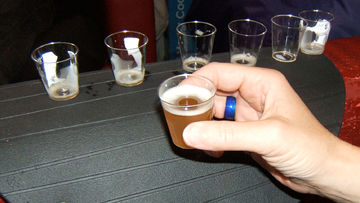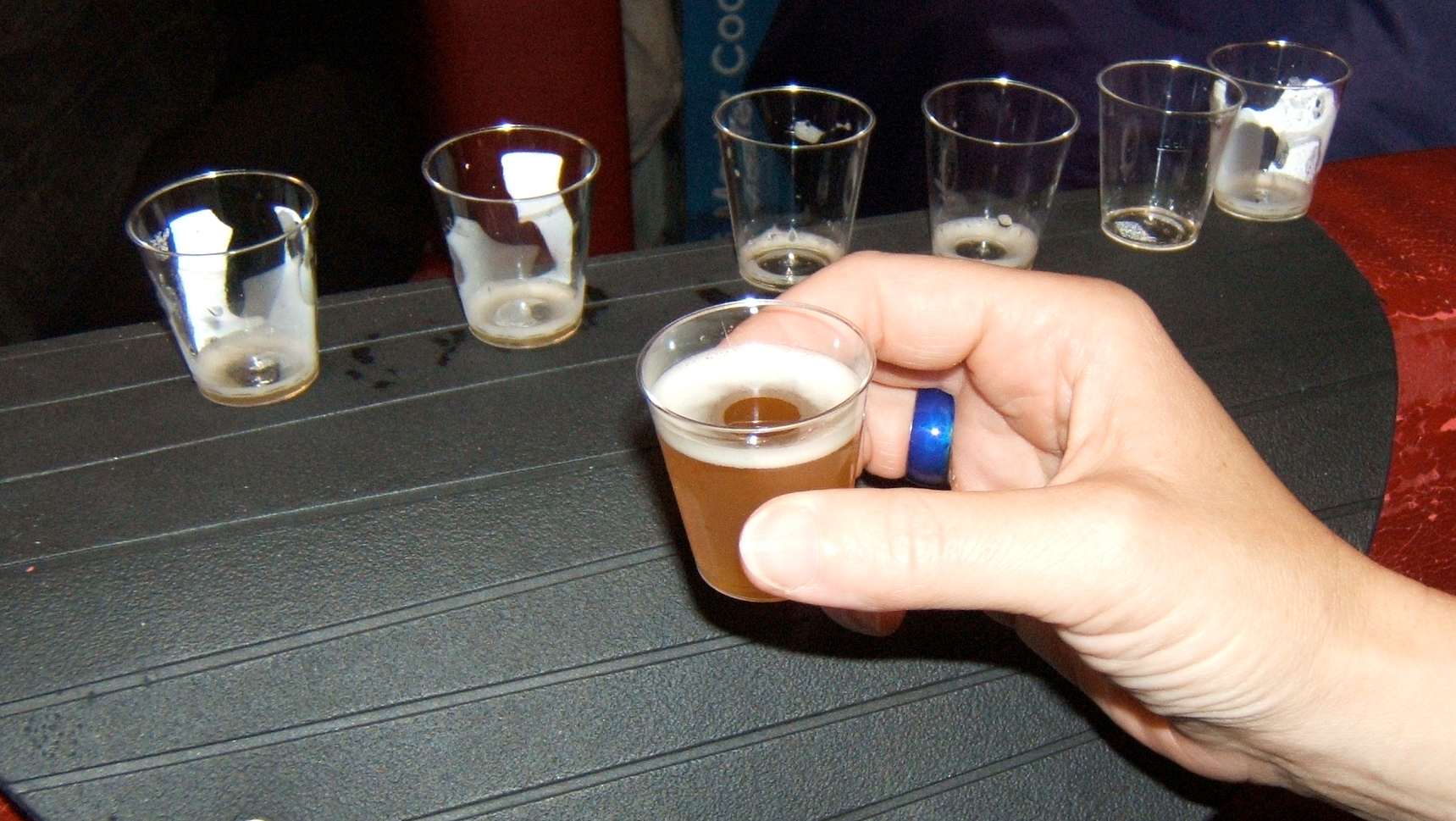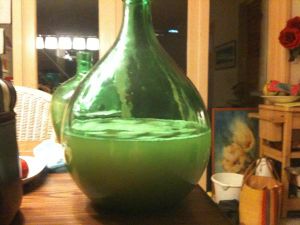k |
|||
| Regel 103: | Regel 103: | ||
:1350 grams honey (dissolved in 1 liter of boiling water) | :1350 grams honey (dissolved in 1 liter of boiling water) | ||
:4 grams yeast (Saccharomyces Cerevisiae var. Cerevisiae) | :4 grams yeast (Saccharomyces Cerevisiae var. Cerevisiae) | ||
| − | 29/12/2011: Started ferment. Measured '''OG''' at 20°C: 1.097 (OG = original gravity) | + | |
| − | 14/01/2012: First racking. Measured '''SG''' at 20°C: 1.048 | + | ;Log: |
| + | :29/12/2011: Started ferment. Measured '''OG''' at 20°C: 1.097 (OG = original gravity) | ||
| + | :14/01/2012: First racking. Measured '''SG''' at 20°C: 1.048 | ||
==The original Club Mate== | ==The original Club Mate== | ||
Versie van 14 jan 2012 20:02
| Project: Hack42-Mate | |
|---|---|
| Naam | Hack42-Mate |
| Door | Lurwah |
| Status | Uitvoer |
| Madskillz | Cooking, Weighing, Measuring, Stirring |
| Doel / Omschrijving | |
| In which I try to develop a recipe for our own Club-Mate derivative. | |
| Alle Projecten - Project Toevoegen | |
Hack42-Mate
My goal is to develop a recipe for an enjoyable Mate-based soda. If eventually found to be good (enough), we might decide to drink our own Mate instead of buying Club-Mate. Whether we do this or not, it is always possible to brew a batch for a party or large event. Who would say no to a keg of home-brew Mate?
- Notes
- Hack42 consumption statistics (2011):
- sept: 4.3 aug: 4.6 jul: 4.6 jun: 2.5 (bottles (0.5 liter) per day)
- Salt might help against bitterness
First Iteration
In this iteration I tried to find out a basic recipe that works, or points towards the right direction. I brewed six different bottles of Mate-soda, based on recipes I found. The plan was to make three basic recipes twice and brew the Mate for either five or seven minutes, resulting in six different batches. The three basic methods were:
- Brew Mate, dissolve sugar. Add citric acid.
- Brew Mate, caramelise then dissolve sugar. Add citric acid.
- Add Mate to the caramelising sugar, then brew. Finally, add citric acid.
This last method is based on the traditional preparation of yerba mate tea. All recipes were cooled to serving temperature and then carbonated with a SodaClub machine. I gathered a taste panel during one of our meets for a "blind" (they didn't know the recipes) tasting of the several batches I brewed. Of course, I also gave them a glass of the original Club-Mate (some people didn't like Club-Mate as much as Club-Mate...). They kindly gave their feedback, a summary of which can be found below the recipes.
Recipes
Note: All degrees(°) are in centigrade.
- Version 1.
- 1 liter water (90°)
- 1 gram citric acid (dissolved)
- 70 grams sugar (dissolved)
- 20 grams Mate (brew for five minutes)
- (Note: Resulted in rapid expulsion of copious amounts of foam after adding CO2)
- Version 2.
- 1 liter water (90°)
- 1 gram citric acid (dissolved)
- 70 grams sugar (caramelised, then dissolved)
- 20 grams Mate (brew for five minutes)
- Version 3.
- 1 liter water (75°)
- 1 gram citric acid (dissolved)
- 70 gram sugar (caramelised with 20 grams Mate) (brew for five minutes)
- Version 4.
- 1 liter water (75°)
- 1 gram citric acid (dissolved)
- 70 grams sugar (dissolved)
- 20 grams Mate (brew for seven minutes)
- Version 5.
- 1 liter water (75°)
- 1 gram citric acid (dissolved)
- 70 grams sugar (caramelised, then dissolved)
- 20 grams Mate (brew for seven minutes)
- Version 6.
- 1 liter water (70°)
- 1 gram citric acid (dissolved) (Possibly 2 grams; I was unsure whether I had added it.)
- 70 grams sugar (caramelised with 20 grams Mate) (brew for seven minutes)
Question form
The question is no longer accepting responses. It was available here.
Results
- Bottle label to recipe key
- A:6
- B:1
- C:Original Club-Mate
- D:5
- E:2
- F:4
- G:3
The Dutch results are here. (Summary: Version 3&6 were most popular)
I have not yet seen anybody use the recipes in version 3 & 6 to make a Mate-soda. So for me it was an exciting result, that these turned out to be the better tasting ones. I decided after the tasting to work on these two recipes in the future.
Second iteration
- Build on Version 3&6.
- Less sugar (50/60 grams per liter?)
- More citric acid(2 grams per liter)
- Caramelise further (Let the sugar turn orange-brown, then add Mate.)
- Brew for 6 minutes at 70-75°C
Recipes II
Not yet available.
Question form II
The second question form voor Hack42-Mate can be found here.
Results II
The second set of (Dutch) results are here.
Future iterations
- Plans
- Further improve base recipe
- Work on a "natural flavour" recipe
- Research kegging and preservation techniques
- Research methods of carbonation (baking soda,fermentation(!),&c.)
Mate mead
I decided to take a sidestep from making Hack42-Mate. I wondered if it would be possible to make an alcoholic version of my Mate recipe. The most natural way seemed to be a mead. The recipe was based on mead recipes I found here and on the two best Mate recipes (3 & 6) from the First Iteration.
- The recipe
- 4 liter water (73°C)
- 10 grams citric acid (dissolved)
- 280 grams sugar (caramelized with 100 grams Mate) (brew for six minutes)
- 1350 grams honey (dissolved in 1 liter of boiling water)
- 4 grams yeast (Saccharomyces Cerevisiae var. Cerevisiae)
- Log
- 29/12/2011: Started ferment. Measured OG at 20°C: 1.097 (OG = original gravity)
- 14/01/2012: First racking. Measured SG at 20°C: 1.048
The original Club Mate
Water Corn syrup Sugar Mate tea extract (0.4g mate in 100ml) Citric acid Coffeine flavor (probably just raw coffeine extracted from coffee beans) Natural flavor Caramel color (E150d, the bad one) Carbondioxide
Found Recipes
po-ru.com: Here’s the recipe for the syrup (yields about 500ml):
50g yerba mate (with stems/con palos) 500ml water (boiled and allowed to cool slightly) 250g unbleached cane sugar 5ml lemon juice To prepare the beverage, mix 1 part syrup with 5 parts carbonated water.
noisebridge.net: Sudo pop is a yerba mate ginger beer.
* Taragui Mate con Palo * 5 Gallon Carboy (secondary fermentation) * 5 Gallon of Pot * Bottle siphon, bottle capper, caps * 5 Gallon (Primary fermentation or mixing) bucket * airlocks, and miscellaneous brewing supplies Directions: 1:1:1:2:10 ratio rosamonde yerba mate: limes & sweet lemons:ground ginger:panela & white sugar:H20 In a small pot, boil ginger and sugar with some water. Boil remaining H20 in 5 gallon pot. Cool the big pot to 85C. Add Mate,steep for 5-7 minutes. Mix back the ginger-sugar mixture to the mate to taste. strain. strain. strain. Pour mixture into carboys to cool, chill, then carbonate.
Make magazine (Dave-Mate):
1L water 50mL (3-1/2 Tbsp or 20g) yerba maté tea leaves 15mL agave syrup 15mL simple syrup 1.25g (1/4 tsp.) molasses 1.25g (1/4 tsp.) guarana 0.6125g (1/8 tsp.) citric acid Drop of orange bitters. Directions: Heat water to 75C/167F, then steep the yerba maté in the water for 5 minutes. Strain the resulting tea into another container. You may need to filter multiple times to remove all the sediment. Add the sweeteners, citric acid, bitters, and guarana.
hackpittsburgh.org:
3 gallons water 85g Chai mate tea (from Teavana) 2.5 cups ‘raw’ cane sugar 1.5g caffeine powder (handle with care!) CO2 (to taste) Terse instructions: Sterilize all equipment. Bring water to just under a boil, add tea and sugar, steep for 5-7 minutes. Cool, add caffeine powder, stir well, then transfer to keg. Float 15psi of CO2 over the mixture, then release the pressure valve and re-pressurize. Repeat 5 times (to purge oxygen from the keg). Let sit for 24 hours, to allow the soda to carbonate, then drop pressure to 7psi and enjoy!


